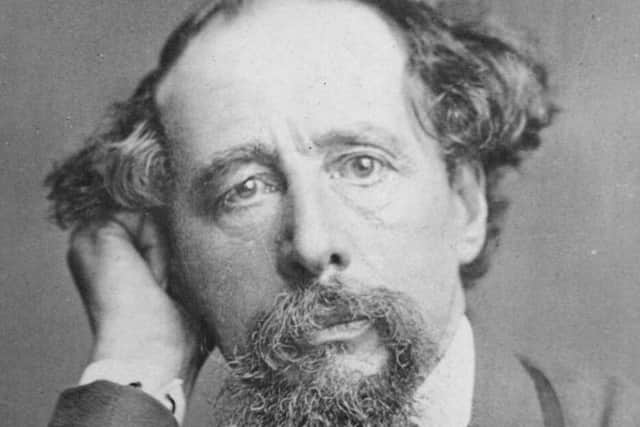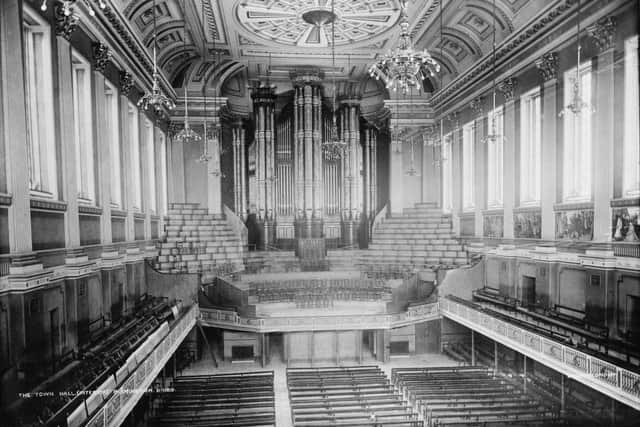'Tickled into laughter': Audience reacts as Charles Dickens reads A Christmas Carol at Birmingham Town Hall
and live on Freeview channel 276
On the snow dusted steps of Birmingham Town Hall they waited patiently, the bite of a winter’s night turning the breath of a 2,000 strong crowd into smoke.
They had gathered for a momentous literary event, an evening that would go down in history. Inside the building Charles Dickens would give his first public reading of the seasonal classic, A Christmas Carol.
Advertisement
Hide AdAdvertisement
Hide AdIt is close to 170 years since Dickens entertained that audience on December 27, 1853. On city centre streets, it was a foul night, in the crowded hall, it was a long one.
Dickens had been allocated a two hour performance, but, relishing his role, continued for three-and-a-quarter. From newspaper accounts, the author was on top form and displayed fine acting skills.


The Birmingham Journal informed readers: “What a grand, fine looking Christmas party it was. The lights were so brilliant, and the drawing room looked so gay, and so many folks looked happy and pleased.
“No party either at this Christmas time, or any other, had such a treat in story telling. And it was a long story, too. “For full three hours and a quarter the host kept the party amused, melted with pathos; or tickled into laughter – not quite genteel combinations; but full of lusty roars, that came warm from the heart; or stimulated to ringing cheers by the homely, kindly moral teachings of the tale.
Advertisement
Hide AdAdvertisement
Hide Ad“But Mr Dickens did not only read the story, he acted it, too. Everybody was charmed by the way in which the story was told. How Mr Dickens twirled his moustache, or played with his paper knife, or laid down his book, or lent forward confidentially, or stuffed his hands in his pockets, or twinkled his eyes as if he enjoyed the whole affair immensely, and as if the story was told for his own especial pleasure, and delight.”
It appears Dickens rather “hammed it up”. But then, he was bolstered by a cocktail of beverages he consumed before every public speaking engagement. On the morning, Dickens would take two tablespoons of rum flavoured with fresh cream, down a pint of champagne for tea, then, a half-hour before stepping on stage, the great man would down sherry and raw eggs.
During the five minute interval, he insisted on beef tea. The writer, who had penned A Christmas Carol a year earlier, could’ve been forgiven for feeling a little queasy, yet he left no stone unturned in giving audiences their money’s worth.


It was one of three Town Hall performances in a matter of days. On December 29, he read his short story, The Cricket on the Hearth, and the following night gave a rendition of A Christmas Carol to an audience he requested should be comprised of the working classes. All were sell-outs.
Advertisement
Hide AdAdvertisement
Hide AdStepping onto a stage that had been into a drawing room, with desk, carpet and gas lamp, Dickens, in full evening dress, made each character come to life. One critic likened him to “an entire theatre company under one hat”.
Birmingham Conservation Trust state: “When Scrooge would appear, Dickens would play the part of an old man, with a harsh crackling voice, a hunched posture and a sour expression, pulling his collar around his face.”
Dickens took the town hall engagement because of his love for the city – Birmingham is portrayed in The Pickwick Papers – and his desire to help the poor. Money from the event would go to the Birmingham and Midlands Institute, which championed education for all. It was an organisation that Dickens would be made president of.
The Birmingham Journal noted: “Mr Dickens having particularly desired that one of the Readings should be given to an audience composed of Working Classes…the Friday evening shall be devoted to that purpose.”
Advertisement
Hide AdAdvertisement
Hide AdOn the Saturday, December 31, the Birmingham and Midlands Institute thanked Dickens by staging a breakfast reception and presented his wife Catherine with a silver flower stand. It was not the author’s first or last visit to the Second City. He had a deep admiration for Birmingham and its people.
During an 1869 speech, he said: “Well, ladies and gentlemen, my heart has all been in my subject, and I bear an old love towards Birmingham and Birmingham men. I have said that I bear an old love towards Birmingham and Birmingham men; let me amend a small omission, and add ‘and Birmingham women’.” Even in those dark days, Dickens, who battled for reforms, was beating the drum for equality.
Comment Guidelines
National World encourages reader discussion on our stories. User feedback, insights and back-and-forth exchanges add a rich layer of context to reporting. Please review our Community Guidelines before commenting.
